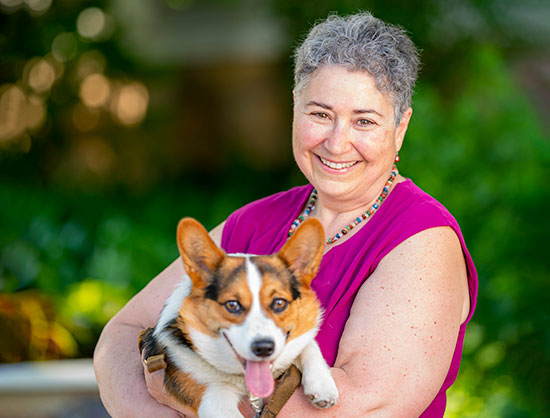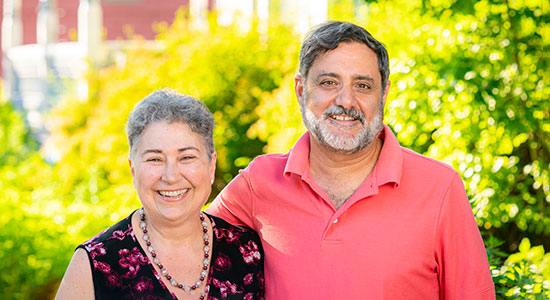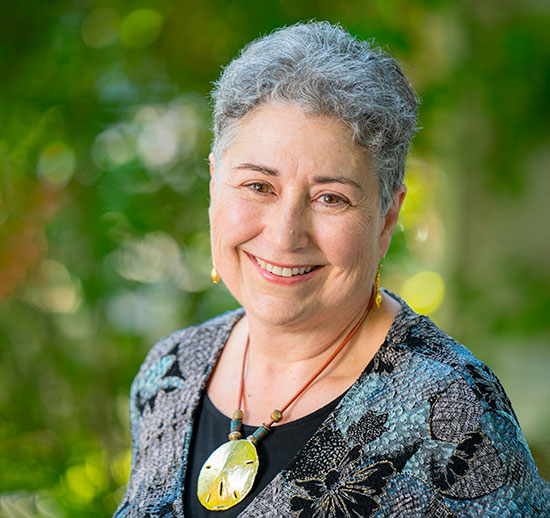
Last winter Cheryl Daniels’ son brought a “pandemic puppy” into his household. Taking Titus to area dog parks became a daily ritual for Daniels – a way to
unplug and tend to her own personal wellness.
Photos: Andy Manis
As Cheryl Furstace Daniels prepared to become president of the State Bar of Wisconsin on July 1, her top priorities included focusing on lessons learned coming out of the COVID-19 pandemic, encouraging State Bar members to start meeting in person again, and advocating for those adversely affected by shorter-term issues like the pandemic — and longer-term societal ills like systemic racism.
“There’s no going back to ‘normal’,” says Daniels, a veteran state government attorney and former administrative law judge (ALJ). “We have to move forward – which means, in part, that we have to think about the good and bad we’ve learned about technology. The good being that we can connect up. It helps people, for example, who might not have the means to be in court or in a meeting. However, we very clearly know that reliable broadband access is an issue in all corners of this state, but particularly where there is already a shortage of attorneys. If you don’t have connectivity, it makes deciding to practice in those underserved areas even harder.”
In addition to advocating for a bipartisan statewide solution on broadband, Daniels, who has spent the past 12 years as assistant legal counsel at the Wisconsin Department of Agriculture, Trade & Consumer Protection (DATCP), also wants State Bar members to regain connectivity face-to-face. “I’m going to be available as much as I can to meet with members, so they can see me and talk to me in person,” she says.
Daniels serves on the State Bar’s Lawyer Well-Being Task Force, which is developing a plan to better address substance abuse and mental health issues that affect Wisconsin lawyers. She anticipates implementing the recommendations coming out of its report, due this fall. She also plans to connect those recommendations with the interrelated issues of diversity, equity, inclusion, and access.
“Black, Latinx, Indigenous, Asian, and Brown lawyers say that navigating their diversity as a lawyer in Wisconsin exhausts them almost beyond their breaking point, as they also navigate the ‘regular’ professional stress that almost all lawyers feel,” she says. “The two issues intersect for diverse lawyers particularly, as they also do for women, LGBTQ, and disabled lawyers. In addition, it shouldn’t be difficult to realize how much extra juggling is done if a lawyer identifies with more than one diversity. So it’s imperative to implement the Well-Being Task Force recommendations through an equity lens.”
As someone who has worked in government all her life, Daniels hopes to draw upon her skills and experience to move the State Bar’s agenda forward in the state capitol and throughout Wisconsin. “I have been all over the state,” she says. “I have had to balance all kinds of pressures from a number of different parties – people who are coming at [issues] from the political side, the policy side, individuals affected by what we do. I feel this experience is helpful in setting the idea that anything I do, I can bring people together.”
Her Father’s Influence
Although her father died when Daniels was only 13, he significantly influenced her career choice. “He made a very colorful remark one time about the fact that I talked too much, and therefore I couldn’t possibly be anything other than a lawyer,” she says. “I was about 7 years old, but it stuck with me. Curiosity about what lawyers did, what judges did, kind of blossomed in my mind and never went away.”
 Ed Finkel is an Evanston-based
freelance writer.
Ed Finkel is an Evanston-based
freelance writer.
Daniels’ family was 1950s working class – her father came back from the Korean War, attended college on the G.I. Bill but never finished, and worked in engineering-related sales. When he died of a heart attack at age 43 in February 1973, Daniels’ mother moved the family from Rochester, New York, where her father’s job had been, to Buffalo, where both of Daniels’ parents grew up. Her mother also knew that Buffalo offered more affordable public-college options for Daniels, then 13, and her siblings, who were 16, 15, and 9.
“Mom got us back to a place where we could all, individually, afford to pay for school,” Daniels says. “I’ve always been grateful to her for that. It meant that I could afford to take on the debt to go to law school. This experience helps me understand what today’s young people, who struggle to pay off their law school debts, are going through.”
Although she was admitted to George Washington University in Washington, D.C., Daniels chose instead to attend the U.W. Law School. “It was a more affordable option,” she says. “I came to Madison, and never regretted it.” While in law school, she met and became engaged to her first husband, Chris Daniels.
Chris finished law school a year earlier and took a position at what was then Ross & Stevens, now DeWitt LLP. When Cheryl Daniels finished law school in 1985, she decided to apply for jobs in state government and found her first position as legal counsel in the Legislative Audit Bureau. “I got a very good grounding in the kinds of government work I would be doing in the future,” she says of her time at the bureau.
Career in State Government
Sixteen months later, Daniels was recruited to join DATCP, where she has worked in one capacity or another for the past 35 years, spending a couple decades as an administrative law judge before attaining her current position as an assistant legal counsel in 2009.
Her early years with DATCP were spent developing a new program to address the farm crisis of the mid-1980s, focused on mediation and arbitration. Daniels had clerked with both a mediator-arbitrator and a bankruptcy attorney during law school but needed to get up to speed on the substantive areas of law involving farms. “I didn’t know farm bankruptcies. I didn’t know the ins and outs,” she says. The State Bar’s Young Lawyers Division proved very beneficial in making the right contacts.
When she was recruited to become an administrative law judge for DATCP in 1988, Daniels ran what was then a one-woman bench. She found that her colleagues in other agencies faced a similar lack of resources – and often came face-to-face with litigants who did not have lawyers and did not understand how to represent themselves in administrative hearings. Through the State Bar’s Government Lawyers Division, she and others formed an Administrative Law Judge Committee, putting on continuing legal education seminars for ALJs and publishing an education booklet, Understanding Your Administrative Hearing, aimed at these unrepresented parties.
“It was the first time ALJs really were able to work together on issues of importance to them,” she says. “I’ve always been a believer in public service. It’s all about figuring it out, trying to get compliance from people if you can, and settling cases so people can move forward. For example, people need to be licensed to get a business; for the most part, they want to do it in compliance with the law. That’s the thing I enjoy most about being a government lawyer – helping people comply with the law. I’m not a litigator at heart. When I was hearing cases with so many unrepresented people, I asked, ‘How do we get people to a place where the parties can settle?’”
As an ALJ, Daniels estimates that 95 percent of her cases went to settlement, and in her past 12 years as assistant legal counsel, only five or six have gone to a hearing. Administrative law judges need to stay neutral in cases, but she believes their role is a bit different from that of civil or criminal judges. “You have to recognize what you’re dealing with. Often times, one party is not represented,” she says. “We work at it for the good of everybody involved. We’re aiming for, if possible, compliance moving forward. That’s in the public good. That’s been my goal.”

New grandparents Cheryl Daniels and husband Michael Rosenberg took their first post-pandemic trip this summer to North
Carolina to visit baby Grace. To relax, they look forward to getting back to attending live music and theater events this fall.
State Bar Involvement: Decades of Service
Daniels’ involvement with the State Bar began with those partnerships she created to further her early work with DATCP. She reflects on the financial crisis in the early 1980s that affected many Midwestern farmers with heavy debt loads. Farm foreclosures rose dramatically. She turned to the Young Lawyers Division for help.
“I suddenly had a whole group of lawyers willing to write a new consumer legal information booklet, A Legal Guide for Wisconsin Farmers, explaining farmers’ basic legal rights and responsibilities in debtor-creditor relationships,” she says. “I had people I could call on to do educational seminars. We produced a consumer video shown on public television. We won awards at the ABA Young Lawyers Division level. That partnership with these young lawyers was so helpful for me.”
After that experience, Daniels was recruited to the Young Lawyers Division board, and “I was off and running in terms of the State Bar,” she says. She soon became the Young Lawyers Division representative on the Wisconsin Bar Foundation, now the Wisconsin Law Foundation, the State Bar’s charitable arm. “It was full of people with a history of service, who believed in service,” she says.
Daniels also wanted to give back to the profession after getting so much help from the State Bar. “I’m a person who enjoys working with people, working in the mix of finding ways to do things better,” she says. “I love the idea of funding programs in the public interest. The State Bar was a place to do all of that. It was kind of a mix of giving back, working with all these great attorneys, and being able to do something in the public interest.”
As someone working in state government, Daniels also was asked to join the board of the Government Lawyers Division, and also served on a number of committees that focused on topics ranging from the independence of the judiciary, to law-related education, to grant-making to local bar associations. “It was a great place to do service,” she says. “I was raising my family. My kids were all part of the bar thing. If we would go to the State Bar’s annual meeting, we would take the kids along. They loved being part of it.”
Chris Daniels, a business attorney, encouraged his wife to forge her State Bar involvement and volunteered himself with the State Bar. But after he died of a heart attack at age 48 in March 2006, Cheryl Daniels needed to pull back.
His death was “unexpected déjà vu [with her father’s passing] since Chris was a healthy non-smoker,” she says. “I was super-active in the Bar until his untimely death.” But she then had children ages 17, 15, and 11: “One going off to college, one just entering high school, and the other was going to go abroad for a year. We had to stop and think about how we were going to do all of this.”
So Daniels eased back her Bar involvement for a time, although she stayed connected to the Law Foundation, which was “something I had really become very attached to,” she says, having already served one cycle as president. “I got my footing back, being a single parent, working, and ramping up to full time” after a period of part-time work. She later served a second term as president during a period of transition for the organization that included changes in the board structure. “They asked me to stay on to help with those changes,” Daniels says. “That’s where I was when I was asked to run for State Bar president.”
After Chris died, Daniels says she often thought of – and drew strength from – her mother’s example. “My dad’s death, as we were in the midst of our elementary, middle, and high school years, made my mother take a deep breath and forge a different route,” Daniels said during her swearing-in speech as State Bar president in June. That resonated when “suddenly dealing with the wrenching loss when Chris died, and having to call on every bit of my mother’s model for me, as a single working parent, to move the children and myself forward.”
Daniels also feels lucky that her second husband, Michael Rosenberg, a litigator whom she met through State Bar service, was just as supportive of her State Bar work as Chris Daniels had been earlier. “Michael has been a great supporter of what I’m doing, even as he’s been doing his own thing with the Bar and his work,” she says.
“Any time I have a litigation-related question or want to know the concerns of attorneys who work for nonprofits, I ask Michael, who is now managing partner of the Madison nonprofit law firm Community Justice Inc.,” she says. “He does criminal appeals, privately, for the state public defender.”

In her year as State Bar president, Cheryl Daniels will put her many years’ experience and skills as a government lawyer and administrative law judge to good use in bringing diverse people together to find good solutions to problems.
A Testimony to Her Leadership
Those who know Daniels are confident in her leadership qualities and say she will lead the State Bar with aplomb. Among them are James Matson, retired general counsel of DATCP, who was on the hiring panel that named Daniels an administrative law judge.
“She is a very strong person, fearless, and willing to take on unpleasant tasks. She has a big heart,” he says. “As an administrative law judge, she went out of her way to help people who were unrepresented have a fair shake on the issues. She’s very open, transparent, and outgoing. She says what she means, but she’s not overbearing.”
Daniels has an ability to see all sides of an issue and has been an effective advocate during her days as an attorney, Matson says. As a judge, “She was very smart legally and understood the context of things, and the realities,” he says. “There’s been a lot of big food-safety cases. She has handled a lot of controversial topics and often high-profile issues. … She’s willing to work with people of all backgrounds. She’s always reaching out to people, in a very giving sort of way. And she’s good at organizing things.”
Sheri Walz, an attorney at DATCP for the past three years, said Daniels is a generous mentor. “Cheryl is a strong role model in how she balanced work and family life throughout her career and in her dedication to public service,” Walz says. “Her love for her family and her work always shines through in our conversations.”
Daniels brings to State Bar leadership her boundless energy and enthusiasm, a willingness to listen, and a sense of fun and camaraderie, Walz says. “Cheryl has found ways to creatively maintain social connections during the pandemic,” she says. “Recently, she organized a team of current and former DATCP colleagues to participate in a Community Justice Inc. virtual trivia night. It was a great way to have a few hours of laughter and fun, safely.”
Kathleen Grant of Madison-based Steinhilber Swanson LLP, a former chair of the State Bar Board of Governors, got to know Daniels through mutual committee work and served at one point as president of the Law Foundation. “We’ve sort of done in tandem stuff over the years for the State Bar,” Grant says. “In so doing, we developed a friendship. … If she was in a pinch, she could say, ‘I need someone for this board or this committee because so-and-so is resigning. Can you step in for a year?’”
Daniels always wants to hear the full spectrum of opinions on an issue and tries to come to a collegial decision, Grant says. “She is not judgmental, despite the fact that she’s been a judge – the best judges are not particularly judgmental,” she says. “She also has a terrific sense of humor, and not much rattles her. She takes criticism well – she doesn’t take it personally. She has had the good-of-the-order top of mind, forever. She has been a very loyal hard worker for the Bar.”
Dean Dietrich of Wausau-based Dietrich VanderWaal SC has known Daniels for decades through their mutual service to the State Bar and the Law Foundation, for which he has served as treasurer and president.
“The legal profession and lawyers today face a lot of new and challenging issues as we maybe move back to the office – or maybe decide not to,” Dietrich says. “As we deal with financial concerns, as we deal with the need for economical legal services for all segments of society, there are huge challenges in the legal profession. I believe Cheryl knows that, sees that, understands that, and is going to try to work very hard with others to find good solutions.”
Dietrich also mentions Daniels’ willingness to ask for suggestions and then sift through them to see what can be implemented to advance goals. “That, I think, comes from her many years of service in the various government positions she’s had,” he says. “But I also think it comes from her experiences over the years ranging from Young Lawyers Division to the Law Foundation to bar activities and operations.”
Peggy Herlitzka, partner at LaCrosse-based Hale Skemp Hanson Skemp & Sleik and president of the Law Foundation, recalls Daniels as being very welcoming to her both as a young attorney and later when she joined the Law Foundation board. “She put me at ease right away,” she says. “That’s a pretty intimidating group of people [on the Foundation] – supreme court justices, former State Bar presidents – and then there’s Cheryl, a great friend.”
Herlitzka describes Daniels as warm, genuine, intelligent, hard working, well respected, and willing to listen to diverse voices. “She’s always encouraged me and other women to take on leadership roles,” she says. “She’s a true servant-leader. She doesn’t just delegate – she rolls up her sleeves, she gets involved in the project, and she helps to find solutions to the problem. She attacks a challenge like it’s an opportunity. And she’s got a quick wit.”
Daniels also understands the challenges facing the legal profession and will make sure the diverse needs of the State Bar are met, Herlitzka predicts. “She always leaves whatever board or committee she’s on better than she found it,” she says. “She’s very innovative. I have big shoes to fill as Law Foundation president.”
Family and Pastimes
As she takes the helm as State Bar president, Daniels no longer has teenagers at home. However, she and her husband are new grandparents; her stepdaughter recently had a child named Grace. With a short trip to see them in North Carolina right after the Annual Meeting & Conference, “It was our first trip after the pandemic,” Daniels said. “And to see this lovely new human being and how well Katie and Ben have taken to parenting made the trip so special.”
Daniels and her husband also look forward to getting back to attending live music events this fall. “We’ve been watching a ton of it on screen,” she says. “Live music and live theater are the best ways to spend free time.” They patronize blues, rock, folk, traditional country, and bluegrass performances. “Even when we’re traveling, we see if there is any live music where we’re going to be, and we go and watch,” she says.
Before the pandemic, Daniels did a lot of swimming to help with chronic back issues, but that went on hold abruptly when COVID-19 hit. Instead, she did some walking and then “ended up taking my old bike out, riding every morning.” That lasted through the fall and revived in the spring. “I do 12 to 15 miles every morning. It clears my head as the sun is coming up,” she says. “Today I rode by the Vilas Park Zoo in Madison, and four amazingly beautiful sandhill cranes crossed my path. It’s a great way to start out my day.”
During the winter, her heart was lifted by the “pandemic puppy” her son brought into his household. She took Titus to area dog parks just about every day. “It’s this little creature who is so joyful to see you,” she says. When walking her son’s dog, “I don’t plug in at all. I don’t listen to music. I’m just in the moment. You connect up with a ton of people. When you’re bike riding, you can smile and say ‘hi’ to people who are also crazy enough to go out in 35-degree weather in the morning and bike. Getting out and doing something is really good for your wellness.”
And no doubt tending to her own wellness will provide Cheryl Furstace Daniels the extra energy and creativity to support the well-being of the State Bar and its members as the state emerges from the pandemic and into the new normal ahead during her year as president.
» Cite this article: 94 Wis. Law. 18-23 (July/Aug 2021).
